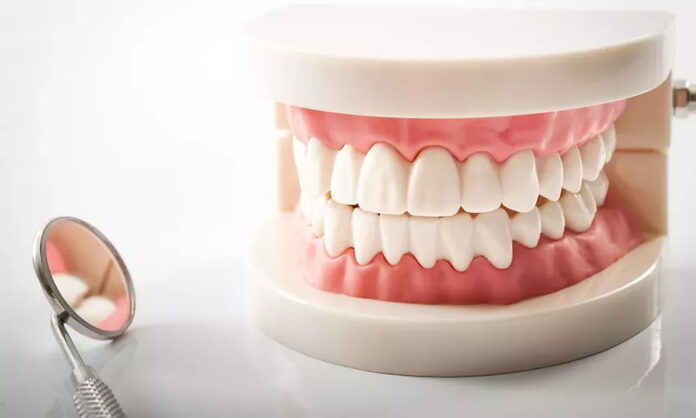Dentists solve the toothlessness problem by fixing dentures to ensure you rock that killer smile and your teeth function well. Even so, dentures are not as indestructible as one may think. Some practices may damage your dentures and render them unusable.
Keep reading to know why your dentures may spoil and how you may fix them.
What Can Cause Your Dentures to Spoil?
People struggle with dentures, especially when they are new and unfamiliar with how to use them. It may even result in lousy denture care practices such as;
– Forgetting to take out dentures when going to sleep – Your dentist will recommend that you soak your dentures overnight in a solution that cleans them. Doing this has the advantage of removing stains and bacteria in your mouth.
– Using your regular toothpaste to clean your dentures – The best cleaning agent is toothpaste meant for cleaning dentures since it doesn’t have the abrasive substances found in regular toothpaste.
– Dropping them – They may sometimes fall off your bedside table or bathroom countertop, causing them to chip or crack. If you’re prone to dropping them, consider insulating the floor area where you put them with carpet or a soft towel.
Step-by-Step Process of Denture Repair
It’s a delicate process that requires expertise from a qualified dentist such as those from 3d smile solutions.
Here are the step-by-step procedures they’ll follow to repair your damaged dentures:
1- Readjust the broken piece together, then apply sticky wax along the fractured line to hold the denture in position.
2- Apply a small amount of plaster to the ridgy tissue side of the fractured part.
3- Place the denture on a glass slab containing plaster and wait for the plaster to set within 10 minutes.
4- Remove the denture from the plaster cast using a lab knife, then trim the cast on the model trimmer.
5- Paint liquid foil substitute over the surface of the impression plaster cast and reposition the dentures on the plaster cast.
6- Wet the fractured line with liquid monomer and powder polymer. Repeat the process for both labial and lingual areas.
7- Apply petroleum jelly over the acrylic resin and wait for the denture to dry out for five minutes.
8- Within 10 to 15 minutes, ensure you place the denture in lukewarm water to ensure that it hardens the acrylic resin.
9- Use a laboratory knife to remove the denture from the cast carefully.
10- Use a vulcanite trimming bur and a dental rug wheel to smooth the repaired area.
11- The dentures are ready for use once again.
Is It a Good Idea to Repair or Get New Dentures?
It depends on the extent of the damage. A dentist can fix the simple chips you may get in your dentures. However, extensive damage like huge cracks and breakages or considerable wear and tear may require you to get a set of new dentures.
Whatever the damage, you need your dentures to remain in top condition to avoid the physical discomfort or health risks a broken denture may cause.
If your dentures need fixing, visit this dentist who does dentures and dental crowns in Chandler to get started.
Read Also
- Achieving a Defined, Balanced Facial Contour in SingaporeA well-defined jawline and a gently tapered lower face — commonly referred to as a V-shaped face — is a look many people aspire to. In Singapore’s beauty and aesthetic scene, treatments that help refine facial contours have grown in popularity as more individuals seek subtle, natural enhancements that boost confidence and balance facial features.… Read more: Achieving a Defined, Balanced Facial Contour in Singapore
- The Wellness Blueprint: How Your DNA Holds the AnswerGenetic testing is revolutionizing preventive healthcare by offering insights into individual health risks. By analyzing DNA, these tests provide a personalized health blueprint that can guide lifestyle and medical decisions. This approach, often referred to as DNA wellness testing, helps to optimize health naturally and prevent potential diseases. In recent years, genetic testing has become… Read more: The Wellness Blueprint: How Your DNA Holds the Answer
- Exploring the Benefits of Infusion Therapy in OKC: The Ultimate GuideUnderstanding Infusion Therapy: A Deep Dive into Its Purpose and Process What exactly is Infusion Therapy? Infusion therapy is an advanced medical treatment that delivers medication and nutrients directly into the bloodstream through a vein, typically via an IV (intravenous) line. This method is particularly beneficial for patients who require a concentrated dose of medication,… Read more: Exploring the Benefits of Infusion Therapy in OKC: The Ultimate Guide
- Ketamine-Assisted Therapies: Impacts on Employee WellbeingWorkplace stress is common today. Many employees feel tired, anxious, or burned out. Regular therapy can help, but some people need more support. Ketamine-assisted therapy is showing good results for mental health. A ketamine-assisted therapist guides each session safely. This therapy can improve mood, focus, and energy. Learning more about it can help teams stay… Read more: Ketamine-Assisted Therapies: Impacts on Employee Wellbeing
- The Future of Men’s Health: Why Telehealth Is Here to StayTelehealth isn’t just a pandemic trend that faded into the background. For Australian men, it has become one of the most practical, time-saving, and stress-free ways to manage everyday health — and it’s shaping the future of how we access care. Platforms like DOCTO, an Australian online doctor and specialist telehealth service, are leading the… Read more: The Future of Men’s Health: Why Telehealth Is Here to Stay
- How to Build a Simple, Clean Skincare Routine ?You don’t need a complicated skincare routine. It doesn’t have to be something that requires twenty different products and confusing steps. Your routine works well with just a few high-quality clean ingredients. The beauty industry keeps pushing more products, but your skin actually needs less. You only need a simple approach to get better results… Read more: How to Build a Simple, Clean Skincare Routine ?







